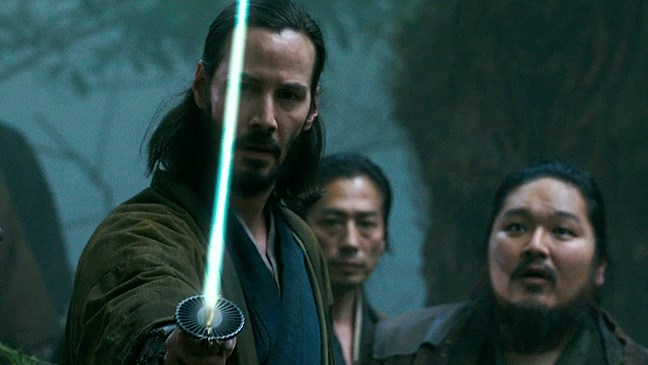47 Ronin
Now playing at International village
Keanu Reeves has range, I’m sure he does. How then does he manage to portray a Japanese warrior with roughly the same surfer-dude inflection he is often parodied for?
“There is no coming back,” could be a line from any of Reeves’ films post Bill and Ted’s Excellent Adventure. It’s a shame, because played with a little less self-seriousness 47 Ronin could’ve been good fun.
Fun is not what immediately comes to mind in the classic tale of Samurai loyalty, which has been turned into plays, TV shows and other films. But Hollywood’s supernatural spin on the early 18th-century event is tailor-made for excess: it has giants, demons, dragons and texture and colour galore. And Reeves, of course.
Reeves plays Kai, a “half-breed” raised and enslaved with knowledge of magic and sorcery. The integration of a Western character into an all-Japanese cast isn’t a smooth one, and the tone of the film feels uneven from the start.
Kai is called into service by 47 outcast samurai — ronin — whose leader Lord Asano (Min Tanaka) has been disgraced and killed. Oishi (The Wolverine’s Hiroyuki Sanada) leads the men, hunts Kai down and orchestrates a scheme to avenge Asano’s death at the hands of the evil Lord Kira (Tadanobu Asano).
It’s 47 men against hordes. (Like 300, but these guys are wearing clothes.)
Added to the mix — and diluting the original legend — are fantastical creatures designed to satisfy on a Lord of the Rings level. Making the most of her role, for example, is Rinko Kikuchi (Pacific Rim) as a shape-shifting witch/enchantress. She’s having more fun than the rest of the cast put together.
47 Ronin is the first feature for Carl Rinsch, at the helm of a whopping $175-million budget. The film gets half marks because of its visual effects, which are enhanced by 3D.
But the storyline is wanting on several fronts, and reportedly underwent several rewrites. Acting is stiff and characters inspire little in the way of audience sympathy, and interaction between players feels dropped at random in between action sequences. Too much exposition panders to stupid viewers, while a twisting of samurai culture in various scenes makes character motivation even less probable: suicide is never a punishment, for example, and honour precedes all. You don’t have to be raised on Miyazaki to know that.


